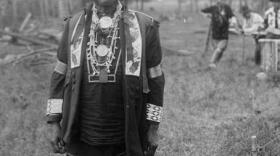This week on A Northwoods Moment in History, Gary Entz looks back on the life of Rhinelander's Paul Browne.
There have been many notable people who have lived and worked in Rhinelander in the 137 years of its existence as a town. The men who built the logging industry clearly defined its early history, but few have had as lasting an impact on the ongoing character of the city as did Paul Browne.
Paul Browne was born in Waupaca in 1858 and grew up in that area. He studied law at the University of Wisconsin in Madison and was admitted to the bar in 1882. He married Florence Brown of Stevens Point and practiced law in Waupaca until 1888, at which point he accepted the position of state timber agent for northern Wisconsin and moved to Rhinelander. Browne quickly became prominent in the Rhinelander community and wore many hats. He was elected as a municipal judge of Oneida County in 1891. In 1893 he erected an office building at 38 West Davenport Street and established Rhinelander’s first insurance agency at that location. He also became president of the Rhinelander School Board in 1897.
Beyond his business and civic presence, Browne was a conservationist and visionary who recognized that the timber industry, along with the jobs it created, was unsustainable. He thus took on several projects to ensure that Rhinelander and other Northwoods communities would survive into the future. With a view toward future tourism, Browne was one of the first in region to seed rivers and streams in the Northwoods with fingerling trout. He also took land he owned on the west side of town, an area then known as Highland View, and established a large orchard and dairy farm where he could conduct agricultural experiments. But those were small in comparison to his greatest accomplishment.
At the turn of the twentieth century, as the logging industry was in obvious decline, Browne negotiated with the Chicago and North Western Railroad for its one-half interest in the Pelican rapids power source on the Wisconsin River. He simultaneously acquired the rights to the Brown Brothers Lumber Company’s option on the other half. With riparian rights on both sides of the river secured, Browne took charge of selling stock and building up capital for a new business enterprise that would define Rhinelander for the remainder of the century. The Rhinelander Paper Company was formally established on April 27, 1903, with Browne as its secretary. Browne, from then on known as the “grand old man” of the Rhinelander Paper Company, continued to serve as company secretary until his death in February 1941.
This story was written by Gary Entz and produced for radio and the web by Mackenzie Martin. Some music for this commentary came Podington Bear. The photo above is used with permisson from the Wisconsin Historical Society and can be found on their website here.
A Northwoods Moment in History is funded in part by a grant from the Wisconsin Humanities Council, with funds from the National Endowment for the Humanities and the State of Wisconsin. Any views, findings, conclusions or recommendations expressed in this project do not necessarily represent those of the National Endowment for the Humanities. The Wisconsin Humanities Council supports and creates programs that use history, culture, and discussion to strengthen community life for everyone in Wisconsin.







